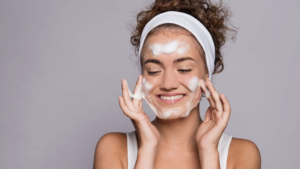स्वस्थ और चमकदार त्वचा सिर्फ़ आनुवंशिकी का मामला नहीं है—यह नियमित त्वचा देखभाल, अच्छी आदतों और सोच-समझकर किए गए विकल्पों का नतीजा है। आपकी त्वचा आपके शरीर का सबसे बड़ा अंग है, जो पर्यावरणीय तनावों, प्रदूषण और रोगाणुओं से सुरक्षा कवच का काम करती है। इसलिए, उचित त्वचा देखभाल दिनचर्या का पालन न केवल रूप-रंग के लिए, बल्कि समग्र स्वास्थ्य के लिए भी ज़रूरी है। हालाँकि अनगिनत त्वचा देखभाल उत्पाद बेदाग़ त्वचा का वादा करते हैं, लेकिन त्वचा के स्वास्थ्य की नींव सरल लेकिन प्रभावी दैनिक आदतों में निहित है।
1. धीरे-धीरे और लगातार सफाई करें

क्लींजिंग किसी भी स्किनकेयर रूटीन का आधार है। दिन भर आपकी त्वचा पर गंदगी, तेल, बैक्टीरिया और प्रदूषक जमा हो जाते हैं। अगर इन्हें ठीक से न हटाया जाए, तो ये अशुद्धियाँ रोमछिद्रों को बंद कर सकती हैं, मुहांसे पैदा कर सकती हैं और त्वचा को बेजान बना सकती हैं। हालाँकि, बार-बार क्लींजिंग करने या कठोर उत्पादों का इस्तेमाल करने से त्वचा का प्राकृतिक तेल खत्म हो सकता है, जिससे रूखापन और जलन हो सकती है।
सही तरीके से सफाई कैसे करें
- सही क्लींजर चुनें: तैलीय या मुहांसे वाली त्वचा के लिए, झागदार या जेल-आधारित क्लींजर चुनें जो अतिरिक्त तेल हटाने में मदद करता है। शुष्क या संवेदनशील त्वचा के लिए, क्रीमी या हाइड्रेटिंग क्लींजर का इस्तेमाल करें जो नमी का संतुलन बनाए रखे।
- दिन में दो बार धोएं: सुबह की सफाई से रात भर का तेल और अशुद्धियाँ दूर हो जाती हैं, जबकि शाम की सफाई से दिन भर जमा हुआ मेकअप, सनस्क्रीन और गंदगी साफ हो जाती है।
- अत्यधिक सफाई से बचें: दिन में दो बार से अधिक चेहरा धोने से आपकी त्वचा की परत को नुकसान पहुंच सकता है और संवेदनशीलता बढ़ सकती है।
- गुनगुने पानी का प्रयोग करें: गर्म पानी त्वचा को निर्जलित कर सकता है और लालिमा पैदा कर सकता है। गुनगुना पानी बिना किसी जलन के प्रभावी ढंग से सफाई करता है।
एक अच्छी सफाई दिनचर्या अन्य त्वचा देखभाल चरणों को प्रभावी ढंग से काम करने के लिए आधार प्रदान करती है, जिससे आपकी त्वचा को सांस लेने और पुनर्जीवित होने का अवसर मिलता है।
2. अंदर और बाहर हाइड्रेट करें

त्वचा की लोच, कोमलता और कोमलता बनाए रखने के लिए हाइड्रेशन बेहद ज़रूरी है। निर्जलित त्वचा बेजान, परतदार और महीन रेखाओं व झुर्रियों से ग्रस्त दिखाई देती है। हाइड्रेशन आंतरिक और बाहरी दोनों स्रोतों से आता है—आप क्या पीते हैं और क्या लगाते हैं।
आंतरिक जलयोजन
- पर्याप्त पानी पिएँ: रोज़ाना कम से कम 8 गिलास पानी पीने का लक्ष्य रखें। अगर आप शारीरिक रूप से सक्रिय हैं या गर्म जलवायु में रहते हैं, तो अपनी मात्रा बढ़ा दें।
- पानी से भरपूर खाद्य पदार्थ खाएं: खीरे, संतरे, तरबूज और स्ट्रॉबेरी जैसे फल त्वचा को अंदर से हाइड्रेटेड रखने में मदद करते हैं।
- निर्जलीकरण करने वाले पेय पदार्थों का सेवन सीमित करें: कैफीन और अल्कोहल का सेवन कम करें, क्योंकि ये शरीर की नमी को छीन सकते हैं।
बाहरी जलयोजन
- उपयुक्त मॉइस्चराइज़र का इस्तेमाल करें: अपनी त्वचा के प्रकार के अनुसार उत्पाद चुनें। हल्के, नॉन-कॉमेडोजेनिक लोशन तैलीय त्वचा के लिए सबसे अच्छे होते हैं, जबकि गाढ़ी क्रीम या मलहम रूखी त्वचा के लिए आदर्श होते हैं।
- नम त्वचा पर मॉइस्चराइजर लगाएं: सफाई के बाद, अपनी त्वचा को धीरे से थपथपाकर सुखाएं और पानी को रोकने के लिए मॉइस्चराइजर लगाएं।
- हयालूरोनिक एसिड का प्रयोग न छोड़ें: यह घटक नमी को आकर्षित करता है और बनाए रखता है, जिससे आपकी त्वचा कोमल और ताजा दिखती है।
लगातार जलयोजन सुनिश्चित करता है कि आपकी त्वचा पूरे दिन लचीली और चमकदार बनी रहे।
3. अपनी त्वचा को धूप से बचाएं

त्वचा की देखभाल के सबसे महत्वपूर्ण चरणों में से एक, जिसे अक्सर अनदेखा कर दिया जाता है, वह है सूर्य से सुरक्षा । पराबैंगनी (यूवी) किरणों के संपर्क में आने से त्वचा की उम्र बढ़ती है, काले धब्बे पड़ते हैं और त्वचा कैंसर का खतरा बढ़ जाता है। बादलों वाले या ठंडे दिनों में भी, यूवी विकिरण वातावरण में प्रवेश कर आपकी त्वचा को नुकसान पहुँचा सकता है।
सूर्य से सुरक्षा के सुझाव
- रोज़ाना सनस्क्रीन लगाएँ: 30 या उससे ज़्यादा SPF वाला ब्रॉड-स्पेक्ट्रम सनस्क्रीन चुनें। बाहर जाने से 20-30 मिनट पहले इसे लगाएँ।
- नियमित रूप से पुनः लगाएं: हर दो घंटे बाद या तैराकी, पसीना आने या तौलिए से सुखाने के बाद सनस्क्रीन पुनः लगाएं।
- ढक कर रखें: बाहर समय बिताते समय चौड़े किनारे वाली टोपी, धूप का चश्मा और सुरक्षात्मक कपड़े पहनें।
- छाया में रहें: सुबह 10 बजे से शाम 4 बजे के बीच सूर्य की सीधी रोशनी में जाने से बचें, क्योंकि इस समय यूवी किरणें सबसे प्रबल होती हैं।
सनस्क्रीन न केवल सनबर्न से बचाता है, बल्कि समय से पहले बुढ़ापे के लक्षणों, जैसे झुर्रियाँ, महीन रेखाएँ और रंजकता को भी कम करता है। अपनी दिनचर्या में सूर्य से सुरक्षा को शामिल करना आपकी त्वचा के स्वास्थ्य के लिए सबसे अच्छे दीर्घकालिक निवेशों में से एक है।
4. संतुलित आहार और स्वस्थ जीवनशैली बनाए रखें

आपकी त्वचा आपके आंतरिक स्वास्थ्य को दर्शाती है। आवश्यक पोषक तत्वों की कमी वाले आहार से मुँहासे, रूखापन या बेजान त्वचा हो सकती है। इसी तरह, तनाव, खराब नींद और व्यायाम की कमी भी आपकी त्वचा की बनावट और कार्यक्षमता पर नकारात्मक प्रभाव डाल सकती है।
स्वस्थ त्वचा के लिए खाएं
- एंटीऑक्सीडेंट शामिल करें: विटामिन सी और ई से भरपूर खाद्य पदार्थ, जैसे कि बेरीज, खट्टे फल, मेवे और पत्तेदार सब्जियां, त्वचा को मुक्त कणों से होने वाले नुकसान से बचाने में मदद करते हैं।
- स्वस्थ वसा का सेवन करें: मछली, अलसी और अखरोट में पाए जाने वाले ओमेगा-3 फैटी एसिड त्वचा की सुरक्षा करते हैं और इसे मुलायम और हाइड्रेटेड रखते हैं।
- अत्यधिक चीनी और प्रसंस्कृत खाद्य पदार्थों से बचें: उच्च चीनी स्तर सूजन और मुँहासे पैदा कर सकता है।
- प्रोबायोटिक्स शामिल करें: दही, केफिर और किण्वित खाद्य पदार्थ आंत के स्वास्थ्य को बढ़ावा देते हैं, जो त्वचा की स्पष्टता से निकटता से जुड़ा हुआ है।
स्वस्थ आदतें अपनाएँ
- पर्याप्त नींद लें: हर रात 7-9 घंटे सोने का लक्ष्य रखें। आराम के दौरान आपकी त्वचा खुद की मरम्मत करती है, कोलेजन और नई कोशिकाओं का उत्पादन करती है।
- नियमित व्यायाम करें: शारीरिक गतिविधि रक्त परिसंचरण में सुधार करती है, जिससे त्वचा कोशिकाओं तक ऑक्सीजन और पोषक तत्व पहुंचते हैं।
- तनाव प्रबंधन: लगातार तनाव से मुँहासे, एक्ज़िमा और अन्य त्वचा संबंधी समस्याएँ हो सकती हैं। ध्यान, योग या गहरी साँस लेने जैसी विश्राम तकनीकों का अभ्यास करें।
जब आपका शरीर पोषित और संतुलित होता है, तो आपकी त्वचा स्वाभाविक रूप से चमकती है।
5. एक नियमित त्वचा देखभाल दिनचर्या का पालन करें

स्वस्थ त्वचा पाने के लिए निरंतरता बेहद ज़रूरी है। हालाँकि ट्रेंडी उत्पाद और झटपट उपाय आकर्षक लग सकते हैं, लेकिन आपकी त्वचा को किसी भी नए तरीके के साथ तालमेल बिठाने और प्रतिक्रिया देने में समय लगता है।
एक सरल दिनचर्या बनाएं
- शुद्धिकरण: सुबह और रात।
- टोन (वैकल्पिक): पीएच को संतुलित करने और त्वचा को मॉइस्चराइजर के लिए तैयार करने में मदद करता है।
- उपचार: मुँहासे, रंजकता या उम्र बढ़ने जैसी विशिष्ट समस्याओं को लक्षित करने वाले सीरम या उपचार लागू करें।
- मॉइस्चराइज करें: स्वस्थ त्वचा बनाए रखने के लिए हाइड्रेट करें।
- सुरक्षा: अपनी सुबह की दिनचर्या हमेशा सनस्क्रीन लगाकर समाप्त करें।
अतिरिक्त सुझाव
- मध्यम रूप से एक्सफोलिएट करें: मृत कोशिकाओं को हटाने और त्वचा की बनावट में सुधार करने के लिए सप्ताह में एक या दो बार सौम्य स्क्रब या रासायनिक एक्सफोलिएंट (जैसे AHAs या BHAs) का उपयोग करें।
- उत्पाद की अधिकता से बचें: बहुत अधिक सक्रिय अवयवों का उपयोग करने से त्वचा में जलन हो सकती है और इसका प्राकृतिक संतुलन बिगड़ सकता है।
- धैर्य रखें: दिखाई देने वाले सुधार में हफ़्तों या महीनों का समय लग सकता है। अपनी दिनचर्या पर टिके रहें और अपनी त्वचा की प्रतिक्रिया के अनुसार बदलाव करें।
नियमित देखभाल और धैर्य से आपको दीर्घकालिक परिणाम मिलेंगे।
अधिक जानकारी: वन न्यूज़ मीडिया


